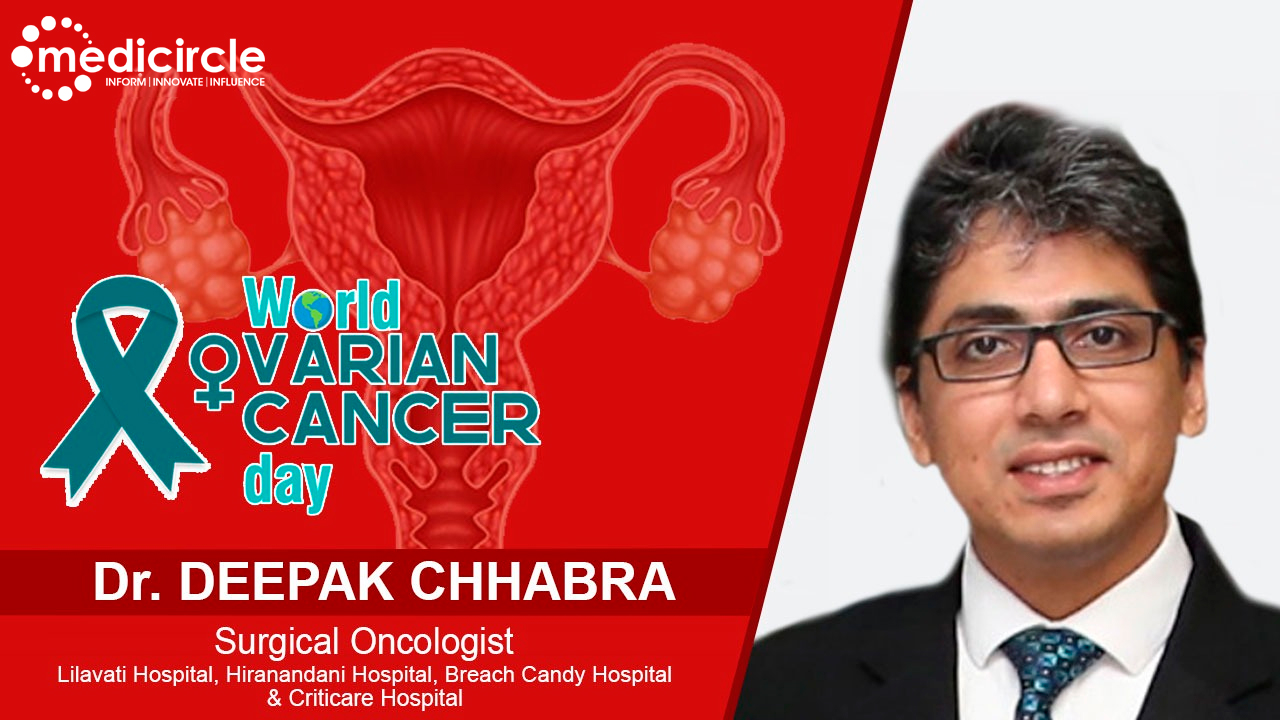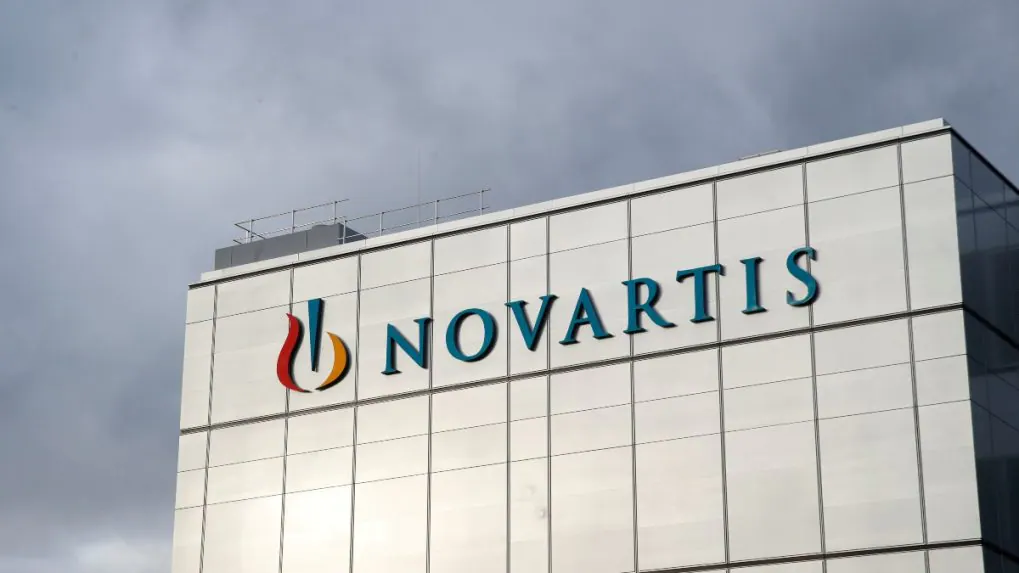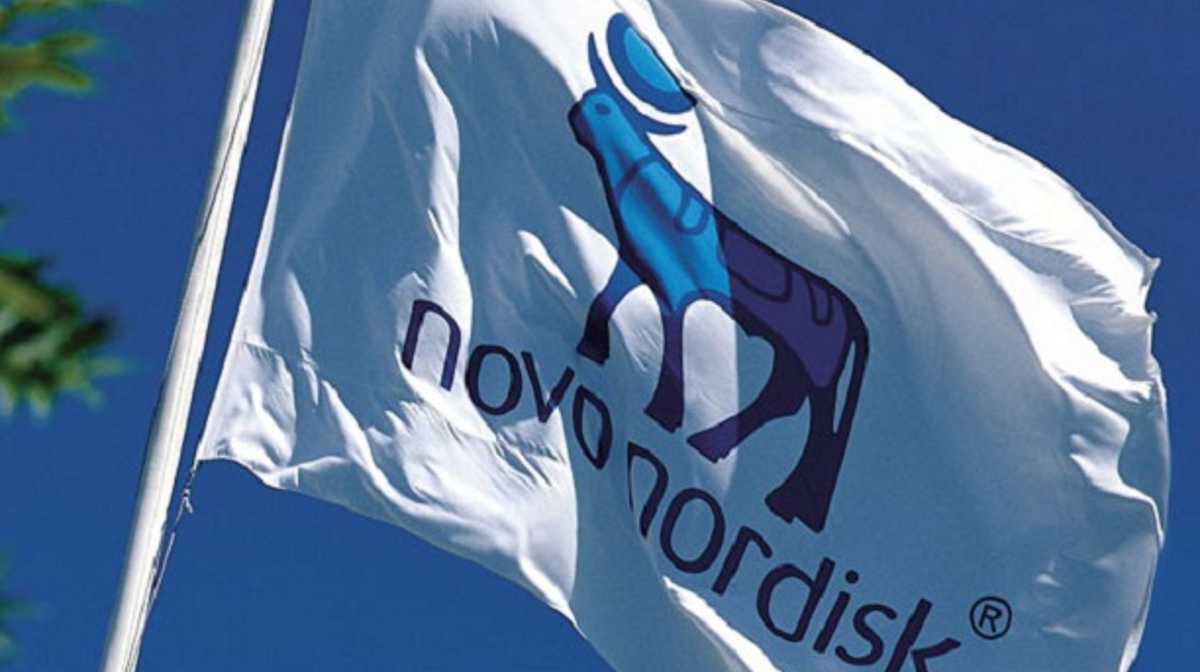Although ovarian cancer may occur at any age, it is more common in women older than 50 to 60 years of age. India has the world's second-highest ovarian cancer incidence. Since the 1980s, there has been a growing drift of ovarian cancer in our country. Medicircle is conducting an exclusive series featuring eminent oncologists and gynaecologists so that people can get direct and more reliable information from them.
Dr. Deepak Chhabra is a Surgical Oncologist with close to two decades of clinical practice. He has operated on thousands of cases of various forms of cancers. Dr. Chhabra is a certified Robotic Surgeon. He specializes in the treatment of Gastrointestinal, Hepato-Pancreato-Biliary, Breast, and Utero-Ovarian Cancer Surgeries. He is associated with Lilavati Hospital, Hiranandani Hospital, Breach Candy Hospital, and Criticare Hospital, Mumbai.
Ovarian cysts – what are they?
Dr. Chhabra explains, “Many a time people come to me with their ultrasound report and suddenly they are scared because there is something which is like a cyst and they want to know what it is. So, one has to understand that a cyst in medical language means that it is a fluid-filled sac. When a small fluid-filled sac comes into the ovaries, it is referred to as an ovarian cyst. Now, the question is what is an ovarian cyst and why do these ovarian cysts develop. You have to understand that the ovaries are the organs in the female that produce the eggs for future fertilization.
The egg is formed within a small bag which in medical language is called a follicle. So, there is a small bag within which there is an egg. And when this follicle forms, it generally gives the form of a cyst and is called a follicular cyst. When this egg breaks out, ideally that follicle should rupture and just finish it off from there. But then there are certain times where in this particular follicle, the egg ruptures out and the area of the rupture seals again. And when this area of the rupture seals again, their fluids keep on forming inside and then develop a much bigger cyst. So, this sometimes can lead to what is called a corpus luteal cyst. Now, again, these follicular cysts and corpus luteal cysts are very common, and there is no need to worry about it when people see these in their ultrasound reports.
Then there are a couple of other cysts which are again these fluid fill bags that come from some glands from the ovary, but maybe either on the inside or the outside, and these are related to the endometrium, which is basically a lining of the uterus, but instead of it being in the uterus, sometimes such lining exists in the ovary and these can give rise to a cyst. When females have menses, at that particular point of time these cysts grow. So, there are endometrial cysts and then there are certain cysts that develop what is called cystadenomas. So, this is in general what an ovarian cyst is,” says Dr. Deepak Chhabra.
Fertility drugs can produce a higher risk of ovarian cancers in women who have not conceived after taking fertility treatment, otherwise such drugs are safe
Dr. Chhabra emphasizes, “We do not have a lot of conclusive evidence that hints at fertility drugs causing cancer, because if that would have been the case, then nobody would have gone for conception using IVF procedures. We need to understand the difference between the fertility drugs and other drugs which women take which are called oral contraceptive pills. Fertility drugs are the ones that induce ovulation and which induce egg formation. So, when you have a fertility drug that is inducing egg formation, it means that you are increasing the number of follicular cysts and the cyst which are growing in the ovary. So, by way of natural hypothesis, you are stimulating the ovary. If an individual is genetically predisposed to developing ovarian cancer, then such patients may develop ovarian cancer. If you see all the articles which are available in the literature or if you read much more in detail about it, fertility drugs are associated with ovarian cancers, especially in those who have not conceived because of fertility.
The whole concept is the utilization of hormones. So, the body of the woman already has hormones, because of the ovaries. In infertility treatment, there is extra stimulation of the hormones and when there is extra stimulation there is an excessive hormone in the body and this excessive hormone is the reason for a majority of the problems. So, if there is pregnancy the excessive hormones produced due to infertility treatments get utilized and washed away during the pregnancy, but if the hormones are not utilized, the woman remains with excessive hormones in the body and those are the cases where it has been shown in the literature that fertility drugs can produce a higher risk of ovarian cancers especially in women who have not conceived after taking fertility treatment,” says he.
Birth controlling pills is the protective mechanism for ovarian cancer
Dr. Chhabra mentions, “What does oral contraceptive pill do? Many people have this confusion that am I taking more estrogens? Am I taking more pills? If you see, the egg formation is stimulated by estrogen, so that is a part of the fertility treatment. But the birth control pills or the oral contraceptive pills that the women take are for suppressing ovulation and because of that, the formation of cysts decreases. So actually, birth control pills, if taken by a woman after having childbirth or for that matter over a longer period of four to five years, is actually a protective mechanism for ovarian cancers.”
Obesity versus ovarian cancer
Dr. Chhabra explains, “Individuals have been defined from various aspects based on the body mass index; from being overweight to obese. 25 - 29 BMI would be considered overweight and anything above 30 would be considered obese. Now, there have been various trials and clinical studies about obesity and cancers in general. We have a strong association of obesity with many cancers which include cancers such as that of the thyroid, food pipe, uterus, endometrium as well as ovary. Individual experiences are different and evidence-based experience is different.”
He further points out, “If you look at the evidence, there has been a larger study in 2017-2018, where there was a large analysis of obesity versus ovarian cancers. And when they looked into obesity versus ovarian cancers, they considered all aspects and took out all the data where people have used different terminologies like overweight people, obesity, waist to hip ratio, ovarian tumors, ovarian cancers, etc., and taking all these as keywords, they have found almost about 43 studies. And within these 43 studies, there have been about 16 odd studies, which have linked a strong association between obesity and ovarian cancers. Whereas there have been about 23 or 25 odd studies, which have not been able to conclusively link ovarian cancers and obesity, and three studies have been inconclusive. So, if you have to look at the situation, then it’s divided.
But if I have to look at the fact, then yes, we don't have conclusive evidence of ovarian cancer, with obesity, we do have some of these extreme studies which do suggest that there is a strong association of obesity with ovarian cancers. Now, again, coming to the cause, one suddenly starts wondering as to why obesity and ovarian cancers, that is because again, it's a combination of the hormones and the fact that there is a peripheral conversion of the fats into estrogens and the higher the number of estrogens in the body, its related to cancer. So, in women, obesity is associated with breast cancer, ovarian cancers, and uterine cancer. So, “yes” and “no” both if we have to answer whether obesity is the cause of ovarian cancer,” says Dr. Chhabra.
Obesity poses risk for cancer, even at the younger age
Dr. Chhabra emphasizes, “Though, we are seeing ovarian cancer risk much higher in the elderly age group of women who are obese, in the younger age group there are multiple other problems. When you have obesity, you have kind of deranged hormonal functions. So many people are developing ovarian cysts, there are so many of them who have insulin resistance. If you have to go into the depths of why obesity causes cancer, you have to see that it is at the molecular and genetic level where it can alter DNA structure, there are inflammatory changes, which happen because of obesity. As I said, there is peripheral insulin resistance in patients like this. So, when you have this obesity-related inflammation which is going on in the background, it is something that puts you at a risk and especially it produces a high estrogenic kind of environment in women. So, because of that, it is natural to assume that obesity should be associated with a higher risk of cancers in women at a younger age group.”
Risk-reducing measures
Dr. Chhabra puts forward following viewpoints upon asked about risk-reducing measures of ovarian cancer:
- “We need to understand why ovarian cancer happens? The very fact that if one is a woman, there is of course risk of ovarian cancers, breast cancers, and uterine cancers. There are certain inborn mutations, BRCA 1 and BRCA 2 which are genetically related and not in our hands. So, what exactly can prevent ovarian cancers are the associated factors. These associated factors are obesity and washing out the hormones from our body through pregnancy. If a woman gets pregnant and breastfeeds, then these are the practices that actually help in washing out the hormones. So, I think the age of marriage becomes important and the age of childbearing becomes important. Breastfeeding becomes important. These are the things that women need to take care of – to marry and have a child at the right age and breastfeeding.
- We also need to get into much more lifestyle changes as preventive measures for all kinds of cancers. These would be reducing your risk for obesity, having a good physical exercise regimen for about 20 to 30 minutes every day. Having good exposure to sunlight, especially in the morning hours, not smoking, etc.
- Sometimes questions that are put to me are whether or not to have a tubectomy or a tubal ligation and does it save one from ovarian cancers? I think, not really.
- If women go for hysterectomy (removal of the uterus), for some purpose, there has been a general trend to preserve an ovary for the hormonal functions to take over at some point of time, but if you are close to 45- 50, I would recommend people to get it out rather than think about hormonal changes because then you are actually at a risk. If there are no ovaries, there are no ovarian cancers, but then I'm not trying to generalize and say that everybody should get the ovaries removed. Risks need to be calculated for individual cases.
- If there is a family history of ovarian cancer, if you have a first, second, third generation relative who has had cancer in the family, I think these women should be taking precautions.
- The last thing is maybe oral contraceptive pills are beneficial. But again, there is a big controversy of should we give it to every lady who comes to the consulting for that matter. I think that would not be right,” says Dr. Chhabra.
(Edited by Amrita Priya)

 Dr. Deepak Chhabra provides a wide spectrum of information about ovarian cysts and ovarian cancer in a conversation with Medicircle. He cites studies to provide an evidence-based response to queries and stresses on lifestyle-based changes, obesity reduction, and the right age of marriage and pregnancy as general measures to avoid ovarian cancer.
Dr. Deepak Chhabra provides a wide spectrum of information about ovarian cysts and ovarian cancer in a conversation with Medicircle. He cites studies to provide an evidence-based response to queries and stresses on lifestyle-based changes, obesity reduction, and the right age of marriage and pregnancy as general measures to avoid ovarian cancer.

















.jpeg)

.jpeg)
.jpeg)
.jpeg)

.jpeg)
.jpeg)
.jpeg)
_(1).jpeg)

_(1)_(1)_(1).jpeg)
.jpeg)
.jpeg)
.jpeg)






